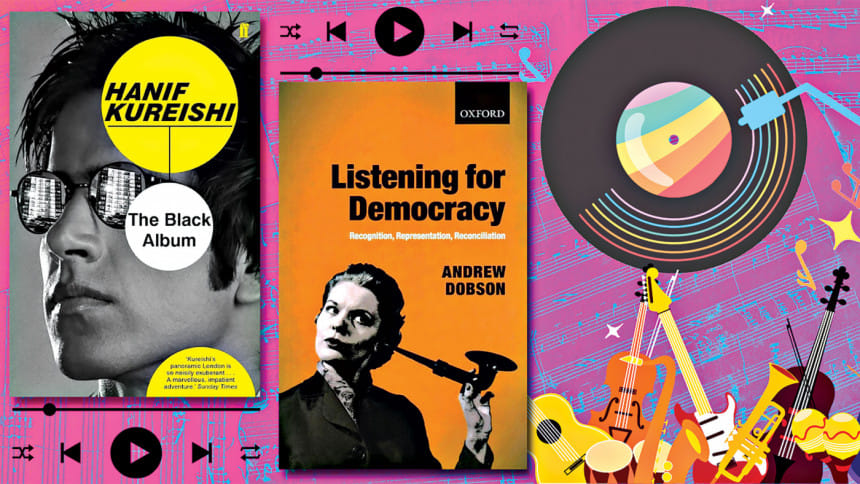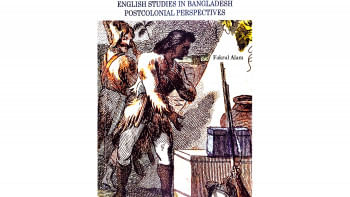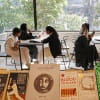On music and literature in a Postcolonial context

As someone who is interested in Muslim novels—by which I mean novels written by Muslims about Muslims—I always feel a scholarly tug towards Hanif Kureishi's The Black Album (Scribner, 1995) when speaking of the at times uneasy but mostly comfortable marriage between music and literature. This amalgamation is conceptualised as music novels, i.e., works of literature that propound protagonists whose engagement with music is an important part of their lives as a form of self-expression and identity formation. This depiction of music within literature—an art form within an art form—is a mere reflection of our everyday reality, and in today's world, replete of any respite, it's as if a background noise is increasingly necessary to keep us grounded.
The Black Album, situated in postcolonial London is obnoxiously filled with pop music references and Shahid, our British-Pakistani and Muslim protagonist is obsessed with the pop icon "Prince", and I say obnoxiously because at times the narrative seems forced, which is not a rare occurrence in such novels. Thus, The Black Album is both a Muslim novel and a music novel and when exposed under the light of postcolonial studies, it uncovers—in a not so surprising manner—that both are still studied within a colonial framework.
Postcolonial studies have focused on the vexed relationship between the West and Muslims, ignoring the quotidian practices of the Muslim individual. Moreover, literature has been the locus of Postcolonial studies and though notable scholars have shown interest in music, they have often ignored pop culture. Though vaguely, I believe I have raised two questions that I will explore further: Is there a postcolonial deafness towards pop culture? And how can we move beyond the colonial framework of analysing novels?
Primarily, Edward Said is hailed as the father of postcolonial studies; secondarily, he is also a critic of classical music in the western context. This is particularly visible in his development of the idea of contrapuntal reading, which, in simple terms is the analysis of literature by taking into account multiple perspectives and how these perspectives engage with each other. The term "contrapuntal" is key here. In musical composition, contrapuntal is when two or more individual, yet harmonious melodies sound together. In tracing a postcolonial deafness towards pop culture, after the passing of Edward Said, his daughter, Najla Said in a ceremony organised by Columbia University reminded the audience "even though daddy could have told you anything you wanted to know about a lot of things, he was entirely hopeless when it came to pop culture". This lack in the personal context disperses heavily towards the scholarly context and thus omits the decolonising capabilities of postcolonial popular music which is extremely important in understanding the historical and ongoing decolonising processes.
In The Black Album, when Shahid converses with his professor and love interest Deedee about pop icon Prince, Shahid says:
"He's half black and half white, half man, half woman, half size, feminine but macho too. His work contains and extends the history of black American music, Little Richard, James Brown, Sly Stone, Hendrix ... He's a river of talent. He can play soul and funk and rock and rap".
Thus, Prince represents an indeterminate, hybrid, liminal subject who does not fit into any single racial, sexual, or gendered category. There is a universal melancholy to almost anything that is musical, and a collective loss whether it is real or perceived. Shahid's loss is that of his identity, synonymous to that of Prince. Shahid is caught between his sexual fascination with Deedee and the communal belonging and political engagement he gains with Riaz and his group of Muslim friends. In other words, Shahid is torn between the liberation of self and the submission to Allah.
A western centric analysis of The Black Album reveals that Shahid eventually opts for hedonistic sensation when he sees a rise of fundamentalist sentiments within Riaz as he endorses the burning of Salman Rushdie's The Satanic Verses (1988). But is it that simple? Can we just conclude that where once Shahid found communal comfort and a sense of belonging becomes a site of such easy rejection? In order to move beyond the colonial framework, one productive step is to read the novel through the ears and what I mean by that is to engage more deeply with the texts towards a multisensory practice of reading and in terms of a music novel, listening seems like the most apt choice.
One dialogue that sticks to me is when Riaz says "Are the white supremacists going to lecture us on democracy this afternoon? Or will they permit us, for once, to practise it?" In Andrew Dobson's Listening for Democracy (Oxford University Press, 2014), after observing dialogical exchanges between the white Americans and Mexican immigrants, it was revealed that "nondominant people's attitudes about disputes improved not after perspective taking but after 'perspective giving'—that is, describing their own experiences to attentive members of higher-ranking groups". Riaz is expressing his desire to be listened to; however, at the end of the novel, Shahid and Deedee leave London after reporting Riaz and his group to the authorities regarding the book-burning, and the attack on the shop and thus, it is uncomplicated to say that Hanif Kureishi is reproducing the vexed relation between the west and Muslims as his protagonist leaves London without any deliberate intention to engage in dialogue, or overcome his disagreement with Riaz and the group. In order to overcome deep disagreements, Andrew Dobson suggests listening as a solvent.
The representation of music in literature is and will always remain an abstract subjectivity even when it gets attached to text, to plot, or to character. In writing literature and composing music, there is a desire to communicate and a basic inability to do so. This increasing gap between the inability to articulate and the desire to do so opens up space for dialogue that carries political and subversive potential. To locate this decolonising potential, first we must acknowledge the postcolonial deafness towards popular culture; and next develop reading practices that allow us to move beyond the colonial framework of analysis, listening being one of them.
Labib Mahmud is an adjunct lecturer at the Department of English and Modern Languages, North South University.

 For all latest news, follow The Daily Star's Google News channel.
For all latest news, follow The Daily Star's Google News channel. 











Comments